Research Method: Reflecting on the Advance Care Directive Process
VerifiedAdded on 2022/08/16
|6
|1091
|17
Homework Assignment
AI Summary
This assignment presents a student's reflection on completing an Advance Care Directive (ACD). The student details the process, including personal details, values directives, and instructional directives. The student identifies challenges faced during the process, such as determining unacceptable treatment outcomes and understanding necessary medical treatments. The student also discusses how completing the ACD enhanced their understanding of patient autonomy and end-of-life care, which will aid their professional practice. Furthermore, the assignment includes a discussion on how to approach ACP discussions with clients, considering cultural sensitivity and effective communication strategies. The student's personal experience is used to highlight areas where clients may struggle, enabling them to provide better support and advice. Finally, the student reflects on the empowering nature of the ACP process and its impact on feelings of dignity and control over future healthcare decisions.
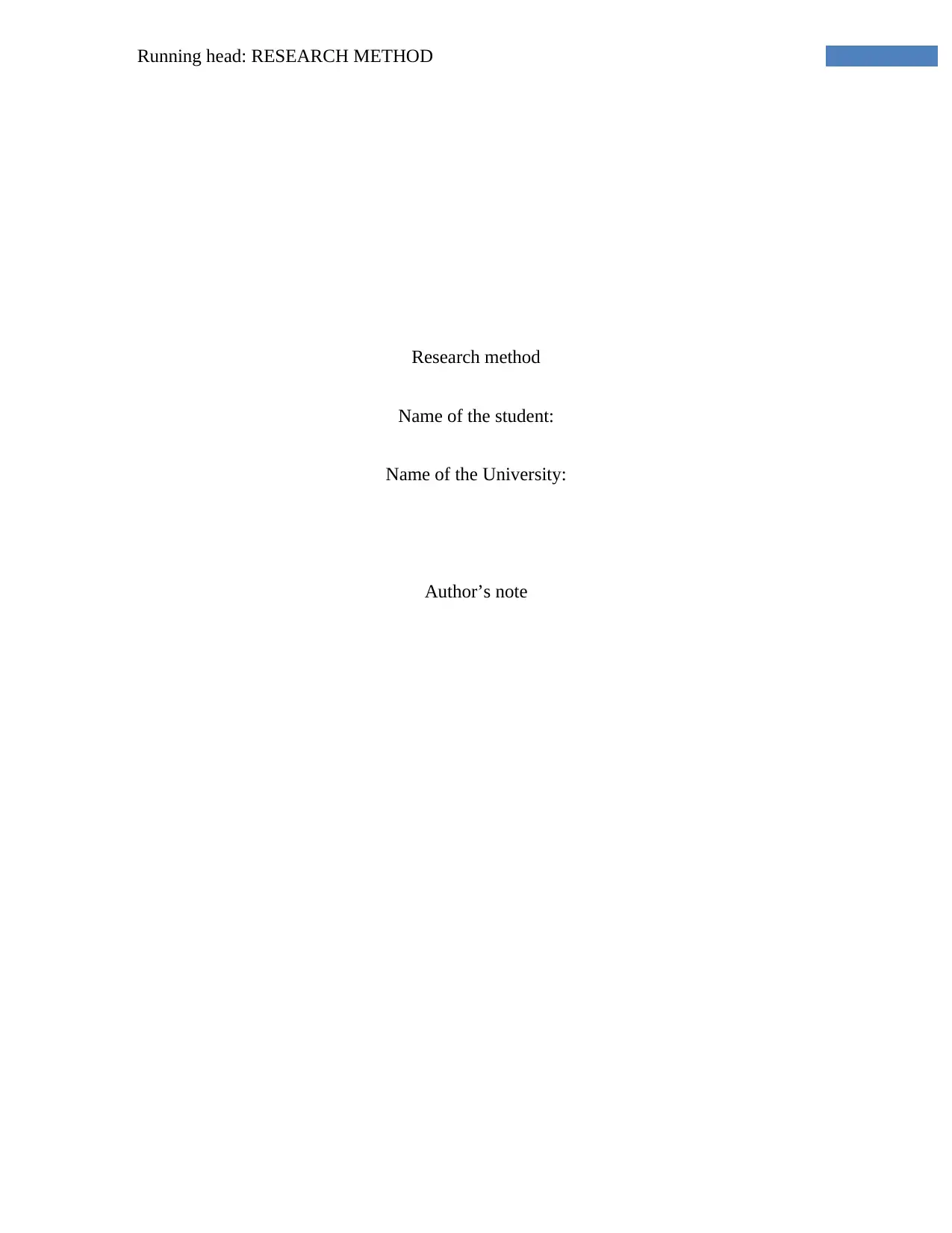
Running head: RESEARCH METHOD
Research method
Name of the student:
Name of the University:
Author’s note
Research method
Name of the student:
Name of the University:
Author’s note
Paraphrase This Document
Need a fresh take? Get an instant paraphrase of this document with our AI Paraphraser
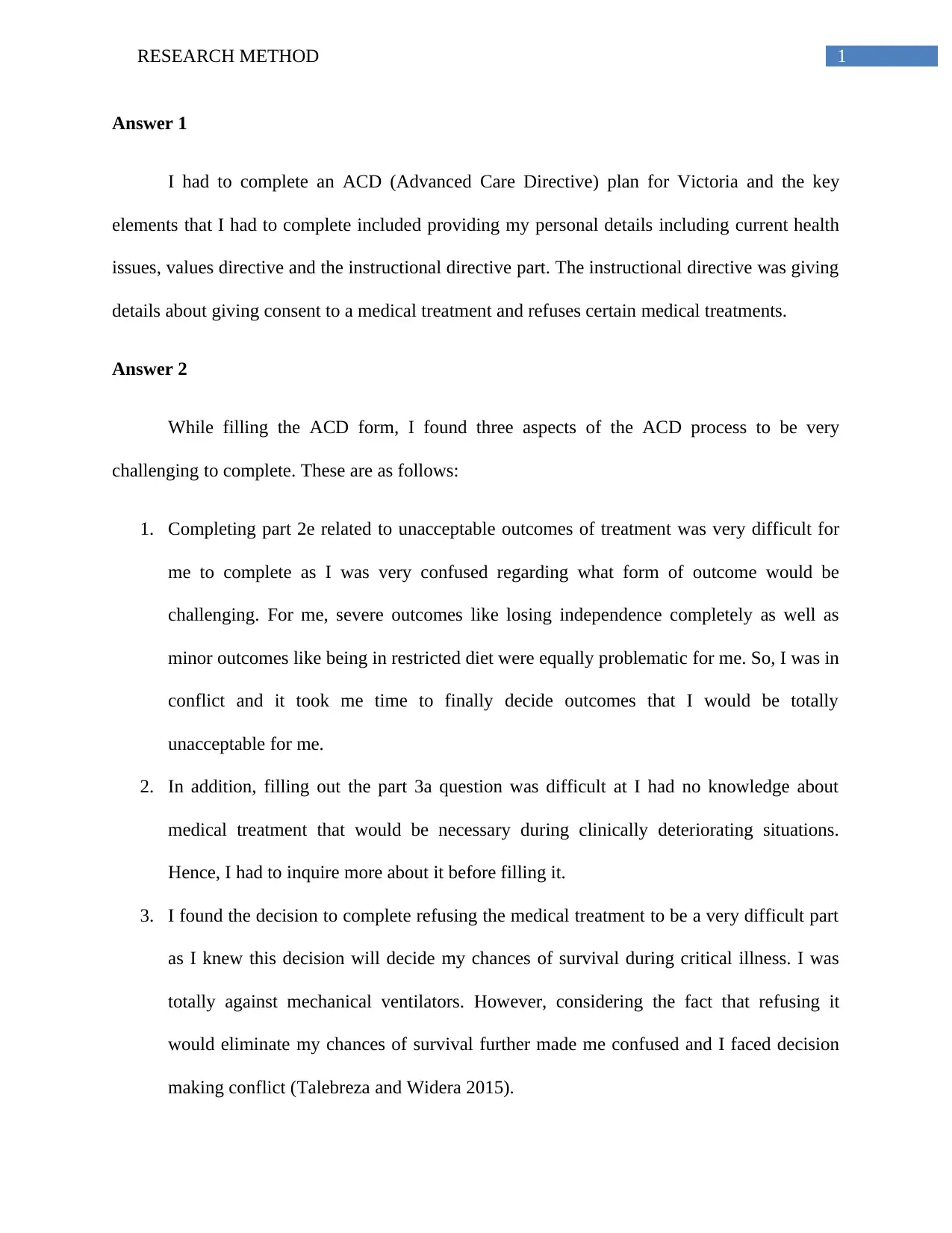
1RESEARCH METHOD
Answer 1
I had to complete an ACD (Advanced Care Directive) plan for Victoria and the key
elements that I had to complete included providing my personal details including current health
issues, values directive and the instructional directive part. The instructional directive was giving
details about giving consent to a medical treatment and refuses certain medical treatments.
Answer 2
While filling the ACD form, I found three aspects of the ACD process to be very
challenging to complete. These are as follows:
1. Completing part 2e related to unacceptable outcomes of treatment was very difficult for
me to complete as I was very confused regarding what form of outcome would be
challenging. For me, severe outcomes like losing independence completely as well as
minor outcomes like being in restricted diet were equally problematic for me. So, I was in
conflict and it took me time to finally decide outcomes that I would be totally
unacceptable for me.
2. In addition, filling out the part 3a question was difficult at I had no knowledge about
medical treatment that would be necessary during clinically deteriorating situations.
Hence, I had to inquire more about it before filling it.
3. I found the decision to complete refusing the medical treatment to be a very difficult part
as I knew this decision will decide my chances of survival during critical illness. I was
totally against mechanical ventilators. However, considering the fact that refusing it
would eliminate my chances of survival further made me confused and I faced decision
making conflict (Talebreza and Widera 2015).
Answer 1
I had to complete an ACD (Advanced Care Directive) plan for Victoria and the key
elements that I had to complete included providing my personal details including current health
issues, values directive and the instructional directive part. The instructional directive was giving
details about giving consent to a medical treatment and refuses certain medical treatments.
Answer 2
While filling the ACD form, I found three aspects of the ACD process to be very
challenging to complete. These are as follows:
1. Completing part 2e related to unacceptable outcomes of treatment was very difficult for
me to complete as I was very confused regarding what form of outcome would be
challenging. For me, severe outcomes like losing independence completely as well as
minor outcomes like being in restricted diet were equally problematic for me. So, I was in
conflict and it took me time to finally decide outcomes that I would be totally
unacceptable for me.
2. In addition, filling out the part 3a question was difficult at I had no knowledge about
medical treatment that would be necessary during clinically deteriorating situations.
Hence, I had to inquire more about it before filling it.
3. I found the decision to complete refusing the medical treatment to be a very difficult part
as I knew this decision will decide my chances of survival during critical illness. I was
totally against mechanical ventilators. However, considering the fact that refusing it
would eliminate my chances of survival further made me confused and I faced decision
making conflict (Talebreza and Widera 2015).
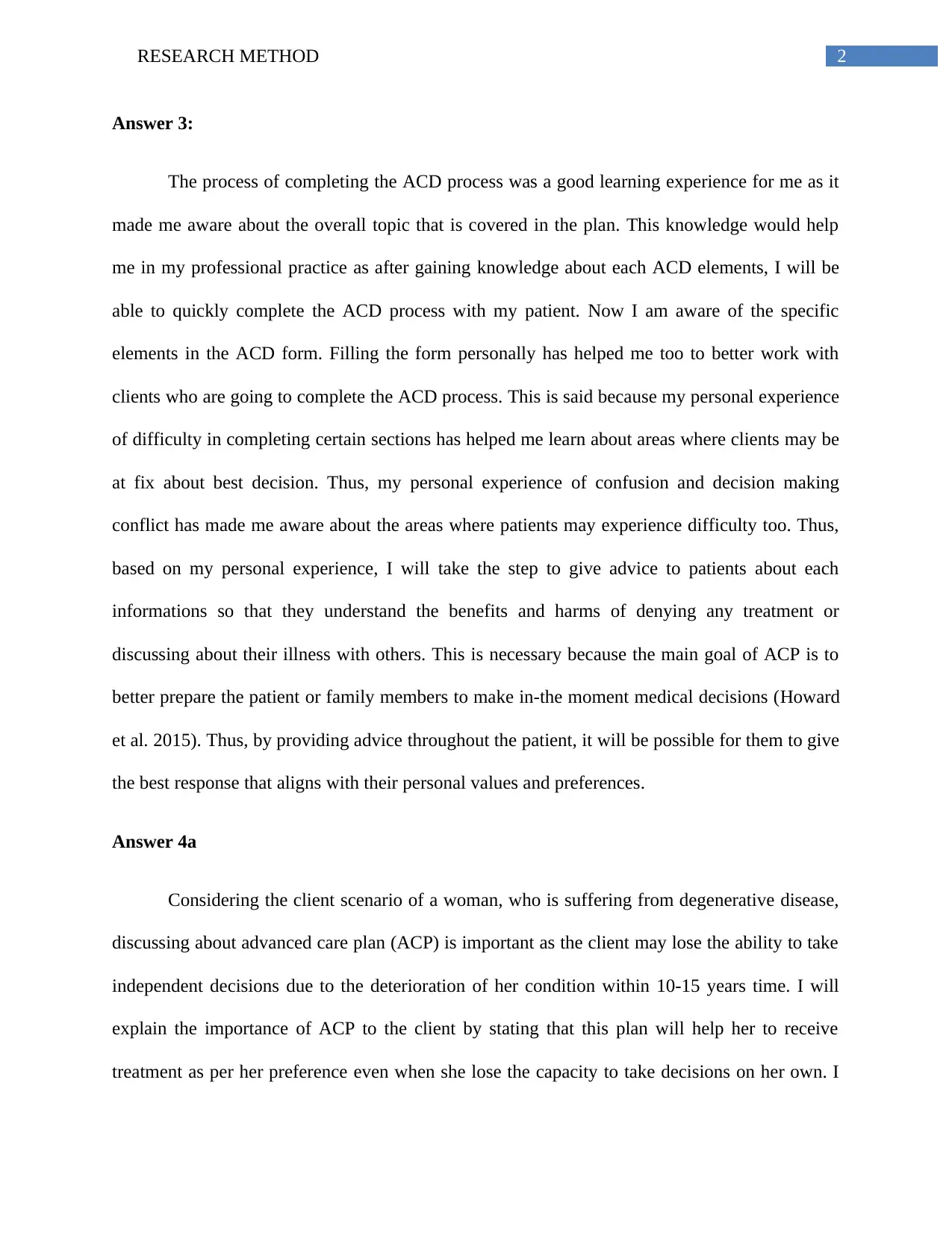
2RESEARCH METHOD
Answer 3:
The process of completing the ACD process was a good learning experience for me as it
made me aware about the overall topic that is covered in the plan. This knowledge would help
me in my professional practice as after gaining knowledge about each ACD elements, I will be
able to quickly complete the ACD process with my patient. Now I am aware of the specific
elements in the ACD form. Filling the form personally has helped me too to better work with
clients who are going to complete the ACD process. This is said because my personal experience
of difficulty in completing certain sections has helped me learn about areas where clients may be
at fix about best decision. Thus, my personal experience of confusion and decision making
conflict has made me aware about the areas where patients may experience difficulty too. Thus,
based on my personal experience, I will take the step to give advice to patients about each
informations so that they understand the benefits and harms of denying any treatment or
discussing about their illness with others. This is necessary because the main goal of ACP is to
better prepare the patient or family members to make in-the moment medical decisions (Howard
et al. 2015). Thus, by providing advice throughout the patient, it will be possible for them to give
the best response that aligns with their personal values and preferences.
Answer 4a
Considering the client scenario of a woman, who is suffering from degenerative disease,
discussing about advanced care plan (ACP) is important as the client may lose the ability to take
independent decisions due to the deterioration of her condition within 10-15 years time. I will
explain the importance of ACP to the client by stating that this plan will help her to receive
treatment as per her preference even when she lose the capacity to take decisions on her own. I
Answer 3:
The process of completing the ACD process was a good learning experience for me as it
made me aware about the overall topic that is covered in the plan. This knowledge would help
me in my professional practice as after gaining knowledge about each ACD elements, I will be
able to quickly complete the ACD process with my patient. Now I am aware of the specific
elements in the ACD form. Filling the form personally has helped me too to better work with
clients who are going to complete the ACD process. This is said because my personal experience
of difficulty in completing certain sections has helped me learn about areas where clients may be
at fix about best decision. Thus, my personal experience of confusion and decision making
conflict has made me aware about the areas where patients may experience difficulty too. Thus,
based on my personal experience, I will take the step to give advice to patients about each
informations so that they understand the benefits and harms of denying any treatment or
discussing about their illness with others. This is necessary because the main goal of ACP is to
better prepare the patient or family members to make in-the moment medical decisions (Howard
et al. 2015). Thus, by providing advice throughout the patient, it will be possible for them to give
the best response that aligns with their personal values and preferences.
Answer 4a
Considering the client scenario of a woman, who is suffering from degenerative disease,
discussing about advanced care plan (ACP) is important as the client may lose the ability to take
independent decisions due to the deterioration of her condition within 10-15 years time. I will
explain the importance of ACP to the client by stating that this plan will help her to receive
treatment as per her preference even when she lose the capacity to take decisions on her own. I
⊘ This is a preview!⊘
Do you want full access?
Subscribe today to unlock all pages.

Trusted by 1+ million students worldwide
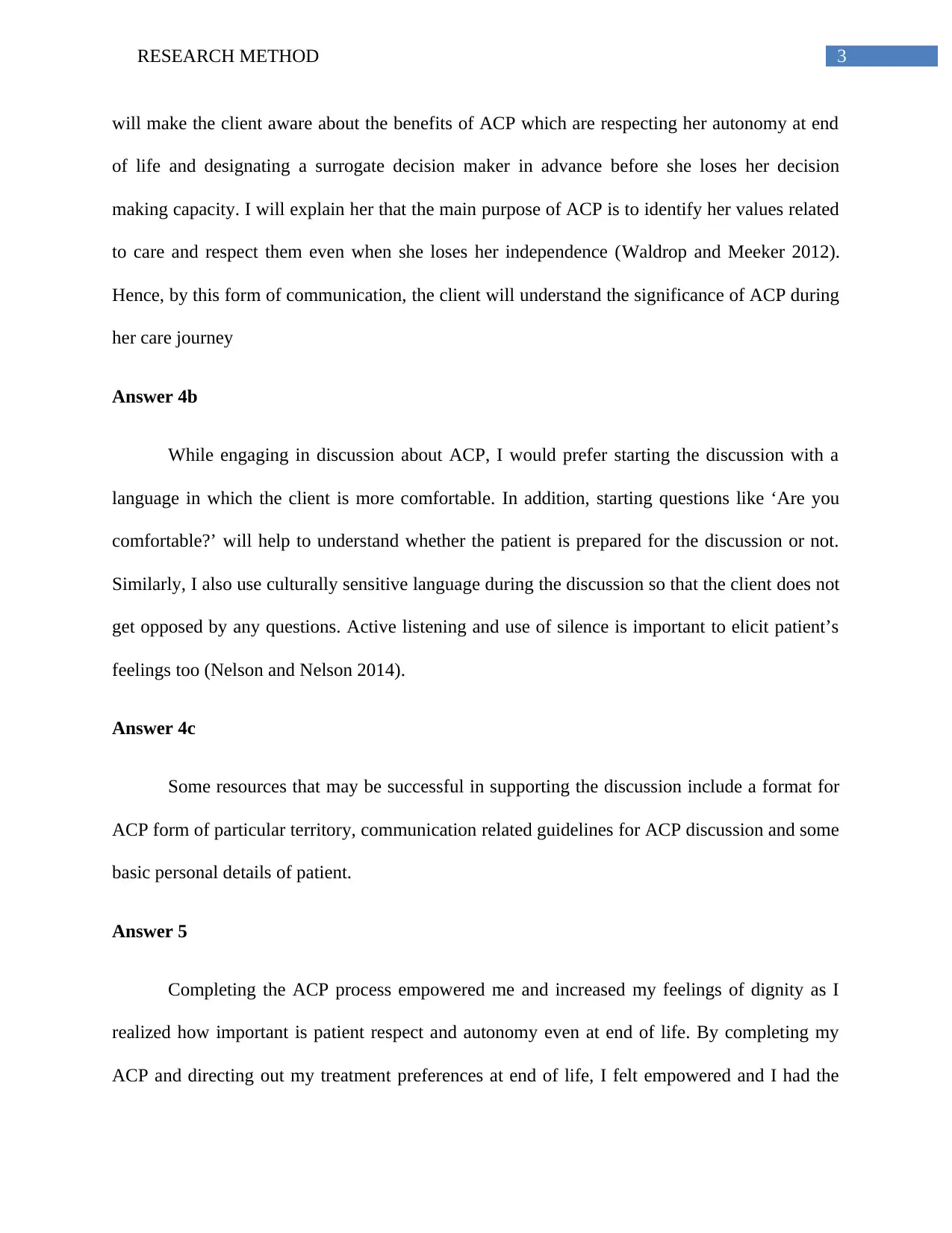
3RESEARCH METHOD
will make the client aware about the benefits of ACP which are respecting her autonomy at end
of life and designating a surrogate decision maker in advance before she loses her decision
making capacity. I will explain her that the main purpose of ACP is to identify her values related
to care and respect them even when she loses her independence (Waldrop and Meeker 2012).
Hence, by this form of communication, the client will understand the significance of ACP during
her care journey
Answer 4b
While engaging in discussion about ACP, I would prefer starting the discussion with a
language in which the client is more comfortable. In addition, starting questions like ‘Are you
comfortable?’ will help to understand whether the patient is prepared for the discussion or not.
Similarly, I also use culturally sensitive language during the discussion so that the client does not
get opposed by any questions. Active listening and use of silence is important to elicit patient’s
feelings too (Nelson and Nelson 2014).
Answer 4c
Some resources that may be successful in supporting the discussion include a format for
ACP form of particular territory, communication related guidelines for ACP discussion and some
basic personal details of patient.
Answer 5
Completing the ACP process empowered me and increased my feelings of dignity as I
realized how important is patient respect and autonomy even at end of life. By completing my
ACP and directing out my treatment preferences at end of life, I felt empowered and I had the
will make the client aware about the benefits of ACP which are respecting her autonomy at end
of life and designating a surrogate decision maker in advance before she loses her decision
making capacity. I will explain her that the main purpose of ACP is to identify her values related
to care and respect them even when she loses her independence (Waldrop and Meeker 2012).
Hence, by this form of communication, the client will understand the significance of ACP during
her care journey
Answer 4b
While engaging in discussion about ACP, I would prefer starting the discussion with a
language in which the client is more comfortable. In addition, starting questions like ‘Are you
comfortable?’ will help to understand whether the patient is prepared for the discussion or not.
Similarly, I also use culturally sensitive language during the discussion so that the client does not
get opposed by any questions. Active listening and use of silence is important to elicit patient’s
feelings too (Nelson and Nelson 2014).
Answer 4c
Some resources that may be successful in supporting the discussion include a format for
ACP form of particular territory, communication related guidelines for ACP discussion and some
basic personal details of patient.
Answer 5
Completing the ACP process empowered me and increased my feelings of dignity as I
realized how important is patient respect and autonomy even at end of life. By completing my
ACP and directing out my treatment preferences at end of life, I felt empowered and I had the
Paraphrase This Document
Need a fresh take? Get an instant paraphrase of this document with our AI Paraphraser

4RESEARCH METHOD
perception that my health is over my control no matter how serious my health concerns may
become in the future.
perception that my health is over my control no matter how serious my health concerns may
become in the future.
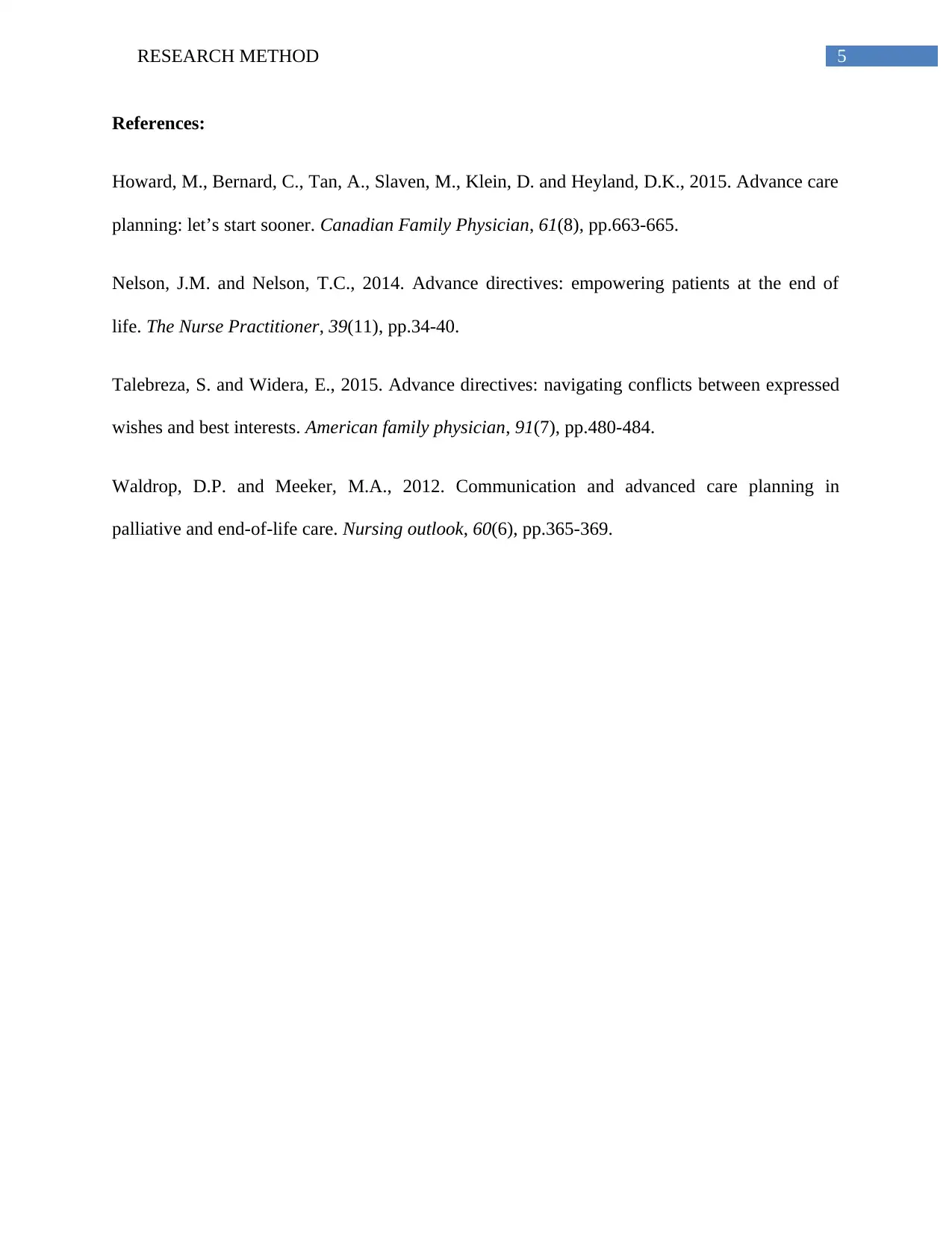
5RESEARCH METHOD
References:
Howard, M., Bernard, C., Tan, A., Slaven, M., Klein, D. and Heyland, D.K., 2015. Advance care
planning: let’s start sooner. Canadian Family Physician, 61(8), pp.663-665.
Nelson, J.M. and Nelson, T.C., 2014. Advance directives: empowering patients at the end of
life. The Nurse Practitioner, 39(11), pp.34-40.
Talebreza, S. and Widera, E., 2015. Advance directives: navigating conflicts between expressed
wishes and best interests. American family physician, 91(7), pp.480-484.
Waldrop, D.P. and Meeker, M.A., 2012. Communication and advanced care planning in
palliative and end-of-life care. Nursing outlook, 60(6), pp.365-369.
References:
Howard, M., Bernard, C., Tan, A., Slaven, M., Klein, D. and Heyland, D.K., 2015. Advance care
planning: let’s start sooner. Canadian Family Physician, 61(8), pp.663-665.
Nelson, J.M. and Nelson, T.C., 2014. Advance directives: empowering patients at the end of
life. The Nurse Practitioner, 39(11), pp.34-40.
Talebreza, S. and Widera, E., 2015. Advance directives: navigating conflicts between expressed
wishes and best interests. American family physician, 91(7), pp.480-484.
Waldrop, D.P. and Meeker, M.A., 2012. Communication and advanced care planning in
palliative and end-of-life care. Nursing outlook, 60(6), pp.365-369.
⊘ This is a preview!⊘
Do you want full access?
Subscribe today to unlock all pages.

Trusted by 1+ million students worldwide
1 out of 6
Related Documents
Your All-in-One AI-Powered Toolkit for Academic Success.
+13062052269
info@desklib.com
Available 24*7 on WhatsApp / Email
![[object Object]](/_next/static/media/star-bottom.7253800d.svg)
Unlock your academic potential
Copyright © 2020–2025 A2Z Services. All Rights Reserved. Developed and managed by ZUCOL.





